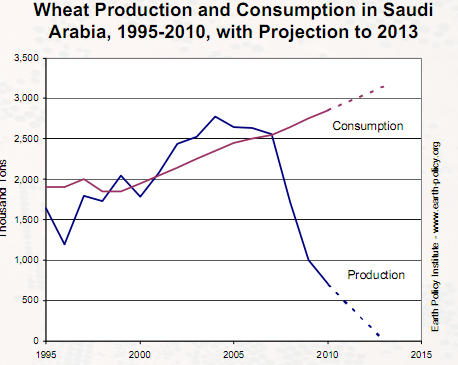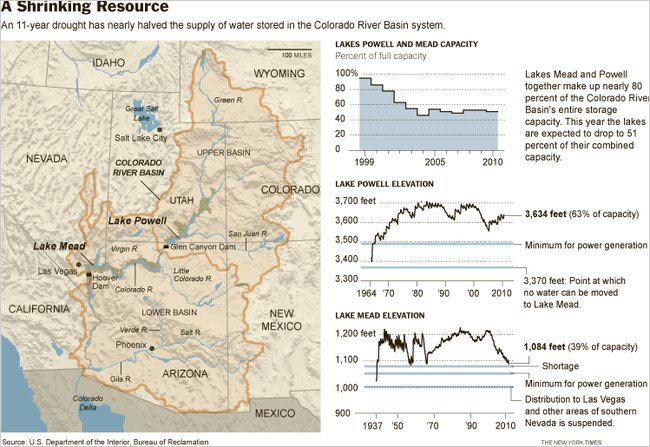This is Part II of a three part series at Actionables on finite resources.
Good quality water sources in the right locations are the key to basic civilization, let alone even minimal economic growth. Like hydrocarbons, water is now the weak link to the maintenance of 7 billion people on the planet. Once abundant aquifers worldwide are being rapidly depleted, and resolving this is expensive and requires growth controls and sacrifice. Growth at any price strategies such as used in China completely fracture in this kind of environment. There is plenty to write on this topic but I will warm up with a little on two trainwrecks: North China and the American Southwest.
China has 2220 cubic feet of usable water per capita, which is one fourth the world average. They use 2/3 of water consumption for crops and livestock. The North China Plain (home of 42% of China’s population) has seen massive water table drops on the order of 120 billion cubic feet since 1970 [Water Shortage Looms]. There are now 700,000 powered wells. This year weather conspired to bring about a perfect storm, a severe drought in the south on the Yangtze River, the most important watershed in China supporting 400 million people [China Faces Worst Drought in 50 years]. In the last few weeks reports are popping up of large scale drinking water shortages. Central and Southwest China are being blasted by continual heat waves. Here is what grain production looks like when a major aquifer id depleted.
Located in the north, Beijing suffers from water shortages [Bejing Suffers from Severe Water Shortages]. It sits on a plain without large rivers and receives little rain fall. The water supplied by reservoirs isn’t enough to meet demand and much of that is diverted to irrigate farmland and provide water for factories. After another year of drought, the Beijing Water Authority revealed that the city’s per capita water resources has declined to 100 cubic meters, far lower than the international warning line for water shortage — 1,000 cubic meters. Incredibly the plutocrats and goons that run the country respond (like the Romans) by putting on luxurious snow entertainment performances. Government has tried expensive engineering projects such as canal diversion of water from the south, but now admits that will fall far short. Only recently have they even bothered with wide-scale well monitoring.
Think the US is much better? The handwriting is on the wall, although for the winter 2010-2011 Lake Mead dodged a serious bullet because of decent mountain snow run off and water from Lake Powell which is now down to 57% full versus 43% for Mead. The Lake Mead roulette wheel can be tracked here. The last time the lake reached low drought levels was 1965 when ten million people depended on this water source versus 28 million now. As Lake Mead’s level drops, Hoover Dam’s capacity to generate electricity, which, like the Colorado River water, is sent around the Southwest, diminishes. If Lake Mead levels fall to 1,050 feet, it may be impossible to use the dam’s turbines, and the flow of electricity could cease. The American Southwest is one dry winter away (La Nina) from an epic water crisis.
Yes, there is water desalination, and that is being developed in Australia and the Middle East. This process is very expensive and requires large energy inputs.
Lake Mead 1985 and 2011
Natural gas fracking is often touted as the answer to US energy. The Texas Water Development Board estimates the total amount of water used for fracking statewide in 2010 was 13.5 billion gallons. That’s likely to more than double by 2020—wash, rinse, repeat.
Source: Wall Street Examiner
This post is reprinted from Russ's premium service, Russ Winter's Actionable. Click here to subscribe to Russ Winter's Actionable, and get instant access.
Click here to access Russ Winter's Actionable










